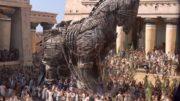Article 10 in a Series (see full lnterfaith list here)
 This series ends by going back to the beginning, why these articles were written in the first place. First, the present inter-faith discussions do not promote open dialogue. The outcome is determined by its participants before an event begins. Second, Islam’s supporters use these events to paint a false picture of Islam and thereby promote division among the uninformed within Richmond’s Jewish and Christian communities. Third, as just alluded to, many Christian’s understanding of their own faith today is so thin they do not understand the differences between Christianity and Islam—let alone why they matter.
This series ends by going back to the beginning, why these articles were written in the first place. First, the present inter-faith discussions do not promote open dialogue. The outcome is determined by its participants before an event begins. Second, Islam’s supporters use these events to paint a false picture of Islam and thereby promote division among the uninformed within Richmond’s Jewish and Christian communities. Third, as just alluded to, many Christian’s understanding of their own faith today is so thin they do not understand the differences between Christianity and Islam—let alone why they matter.
The Purpose
A further peril arises because progressive ideas exist within our society today. These parallel Islam in many respects, because they both come from the same root. If we do not get this right, we risk losing our identity as a people, and that is simply unacceptable. Therefore, these final articles focus on three actions we as Christians should not take, using inconsistencies and deficiencies expressed by secularists and some American Christians, and applying simple logic.
Previous articles reviewed some significant differences between Christianity and Islam, and why they matter. This wasn’t done to promote division, but used both Christian and Islamic source documents to put forward truth. We need a meaningful discussion to make informed decisions, and only understanding truth gives us that opportunity. It is unfortunate today that truth is rejected by some within our society, but that is all the more reason why it must be spoken. It is rare and essential.
We’ve seen some of Islam’s followers present significant distortions, omissions, and deceptions in both written and oral forms. But they are only following what they are called to do, an ideology where the ends are used to justify the means. This ideology contains a concept called taqiyya to advance Islam, an idea supported by Muhammad’s behavior. This concept is most often associated with Shi’ite Islam, but is also incorporated into some traditions relied on by Sunni Islam.
Taqiyya and Islam
During the Battle of the Ditch (in 627) Muhammad’s followers were surrounded by forces from Mecca and its allies. Those attacking Medina were not strong enough to penetrate its defenses, but neither were Muhammad’s forces strong enough to break the siege. During the siege a Ghatafan (Arab tribe) convert to Islam, whose tribe did not know had converted, approached Muhammad and asked him what could be done to help. Muhammad replied,
You are only one man among us, so go and awake distrust among the enemy to draw them off us if you can, for war is deceit.[1]
The Ghatafan convert went to the Jews, Meccans, and Ghatafan that were allied against Muhammad, and was able to sow distrust among them. The siege fell apart. Shortly thereafter, Muhammad received a vision and was told to fight against the B. Qurayza, the Jewish tribe that had assisted the Meccans and Ghatafan in the siege. The Jews surrendered on the condition that their fate be determined by an umpire they appointed. Muhammad agreed. The umpire the Jews appointed said, “Then I give judgement that the men should be killed, the property divided, and the women and children taken as captives.”[2] The sirat goes on to say,
Then they [the Jews] surrendered, and the apostle confined them in Medina in the quarter of d. al-Harith, a woman of the B. al-Najjar. Then the apostle went out to the market of Medina … and dug trenches in it. Then he sent for them and struck off their heads in those trenches as they were brought out to him in batches. … There were 600 or 700 in all, though some put the figure as high as 800 or 900.[3]
The Take-Away
Dividing enemy combatants in war is a valid tactic, one sanctioned by Muhammad’s example. Both Dr. Dammaj and Pete Seda indicated there was no such thing as holy war within Islam. But if there is no holy war against non-Muslims, then why the deception to promote Islam? Further, it is one thing to use deception against enemy combatants in war, but another entirely to use it against civilians you say you are not at war with. Peace, unity, and truth come from God. Conflict, division, and deceit do not.
But this tactic makes sense if we look again to the Muslim Brotherhood’s Explanatory Memorandum, and the role Islamic centers are to play within their plan for the U.S. and Canada.
In brief we say: we would like for the Islamic center to become “The House of Dawa’”[4] and “the general center” in deeds first before name. As much as we own and direct these centers at the continent level, we can say we are marching successfully towards the settlement of Dawa’ in this country.[5]
We would appreciate your donation.
We must resist their plan if we wish to retain our society, our religion, our freedom, and our identity. Defeating it requires at least two things. First, an understanding of that plan. Second, possessing sufficient strength in our own faith to defend it. We can also add a third item to counter their plan, we simply use Islam’s history against it. The following actions are oriented to the second item. All these proposed actions require the kind of learning and understanding that becomes wisdom. And all require unity.
Don’t Let Go of God, No Matter What
I will attempt in my own inadequate way to use logic alone—to be rational in writing about each action. First causes, such as God, cannot be demonstrated, but that doesn’t mean logic cannot be used to make inferences, attempting to draw some understanding from the facts lying before us.
God Exists
Our only solution lies in following God, but there appear to be at least three reasons for not doing so. Either God does not exist in the first place, or He exists and is either one with creation or does not care about creation at all. The beginning for refuting this first point is existence itself. The real question is not that something exists, but rather why something exists—or in another form, why nothing does not exist. That something exists there is no doubt, for we are part of it. We are and we know that we are. To say otherwise, is foolishness. A simple proof. If you believe there is no existence, then please come by for coffee some time. I’ll pour it from above your head into a cup you hold in your lap. After all, if I miss it won’t matter because you don’t exist.
God is Separate from Nature
All creation involves separation, not unification. If there is a house, there must be a builder. If there is a work of art, there must be an artist. If there is a car, there must be a manufacturer. If there is a creation, there must be a Creator. The real difference here is creation’s Creator must be infinite. Nothing finite (like man) can create something else finite from nothing. Creation can be viewed not so much as a final product, but the material from which other things can be created. However, man does not have the ability to create something from nothing.
Creator must also have existed before creation. The builder must exist before a house can be built, the artist before a work of art can be created, or the manufacturer before a car can be built. There must be time, a type of order, created in conjunction with creation.
Judeo-Christian beliefs provide the only explanation for all the above. There is a Creator. He is infinite, and therefore outside of time. He created creation.
Man Holds a Unique Place Within Creation
In addressing the first point, we’ve gone a long way toward addressing the second, the question of whether He is separate from His creation. But we can go further using the previous example. An elephant possesses much strength, but can it build a house? A dog an overwhelming disposition to please its master, but can it paint a picture or write a story—even a bad one? An ape possesses dexterity and ingenuity, but can it clear the land and cultivate a field? The answer to all of these questions is No.
Only man, in all of creation, can do any and all of these things. Therefore, while man is a part of creation, through this difference he must at least hold a distinct place within it. Post-modernism holds the Eastern perspective that all creation is one. If this is true then men must be no different from the rest of creation. However, we’ve just seen that is not the case. We can use another example concerning nature and man from G.K. Chesterton,
There is no equality in nature; also there is no inequality in nature. Inequality, as much as equality, implies a standard of value. To read aristocracy into the anarchy of animals is just as sentimental as to read democracy into it. Both aristocracy and democracy are human ideas: the one saying that all men are valuable, the other that some men are more valuable.[6]
To discuss such strictly human ideas as aristocracy and democracy is unique to man. I hold the difference between man and the rest of nature noted above is due to only one thing, that man alone has been given God’s image. An inward image, that includes our mind and ability to reason. It is the only reason we can have this discussion, let alone it mean anything at all.
To be sure, this image within man is a very dim image of God, far removed from Him. But it is also true that there is nothing else in all creation that is closer. Man alone is capable of doing things the rest of creation cannot do. So man is distinct, or separate if you will, from the rest of creation, just as God as creator is not one with creation.
God Loves and Therefore Must Care
Eastern religions and the ‘New Age’ movement rely on the proposition that Nature is our mother. We must worship the Creator within, the Creator that is also within Nature. If true, we must look at our neighbor as our self. However, love is not possible if we are all one. Only if we are separate is love possible. Love is experiential. It requires an object outside ourselves. This is true for the love to be shared between man, and also true for the love that we should have for nature. It is this latter love that provides the drive for true progress to occur.
On the other hand, Christianity asserts that Nature is our sister, both created by the same Creator but separate. God created creation, man and nature, out of love. The following proof this is so was offered by Clement of Alexandria in the second century.
For assuredly He does not hate anything, and yet wish that which He hates to exist. Nor does He wish anything not to exist, and yet become the cause of existence to that which he wishes not to exist. Nor does He wish anything not to exist which yet exists. If, then, the Word hates anything, He does not wish it to exist. But nothing exists, that cause of whose existence is not supplied by God. Nothing, then, is hated by God, nor yet by the Word. For both are one – that is, God. … If then He hates none of the things which He has made, it follows that He loves them. Much more than the rest, and with reason, will He love man, the noblest of all objects created by Him, and a God-loving being. Therefore God is loving; consequently the Word is loving.[7]
But if God is one then how does He have love to give? The answer lies in that Christianity alone adheres to there being a single Triune God. A God that is personal. A God who became man. By there being three persons within one single essence, there is community and therefore can be love. You can give only what you’ve got.
These are paradoxes, but that is something that separates Christianity from paganism. The Greek philosophers believed that virtue and vice were a balance, a matter of degree. Black and white make gray. Thus ideas such as the noble lie. Christianity resolves this riddle by saying both fully present and both are in conflict. Black is black and white is white, but both are fully present at the same time. Our choices determine which we do.
One final point. When we embrace a universalist view of God, and worship the God within, we end up worshipping ourselves. We worship man. Also, this single God cannot love, there is no Being. He must give Creation something that He does not possess. Chesterton points out where this path leads for creation. “According to most philosophers, God in making the world enslaved it. According to Christianity, in making it, He set it free.”[8] This is the reason God made man free, but Allah made man slaves.
But one may still ask how is a Triune God possible? As a finite human being we can only respond it is a mystery, for He is God.
Dan Wolf is a researcher, analyst, and author. He has written three books examining the relationship between faith, freedom, virtue, and charity. Together these form the cornerstone of our purpose, and our society’s foundational principles derived from those relationships. Links to his work can be found at the Living Rightly website.
[1] Guillaume, A., The Life of Muhammad, A Translation of Ibn Ishaq’s Sirat Rasul Allah, p. 458, Oxford University Press, 2006.
[2] Ibid, p. 464.
[3] Ibid.
[4] According to http://www.thefreedictionary.com/, Dawa means “the practice or policy of conveying the message of Islam to non-Muslims.” Accessed 09/17.
[5] Muslim Brotherhood’s, An Explanatory Memorandum, On the General Goal for the Group in North America, p. 10, as posted on the Clarion Project website. https://clarionproject.org/muslim_brotherhood_explanatory_memorandum/. Accessed 08/17.
[6] Chesterton, G.K., Orthodoxy, p. 65, Jefferson Publication, 2015.
[7] Rev. Alexander Roberts and James Donaldson, The Ante-Nicene Fathers, Fathers of the Second Century: Hermas, Tatian, Athenagora, Theophilus, and Clement of Alexandria (Entire), Vol. 2, p. 225, Wm. B Eerdmans Publishing Co., 1989. Paedagogus, Book I, Chapter VIII.
[8] Chesterton, G.K., Orthodoxy, p. 49, Jefferson Publication, 2015.




